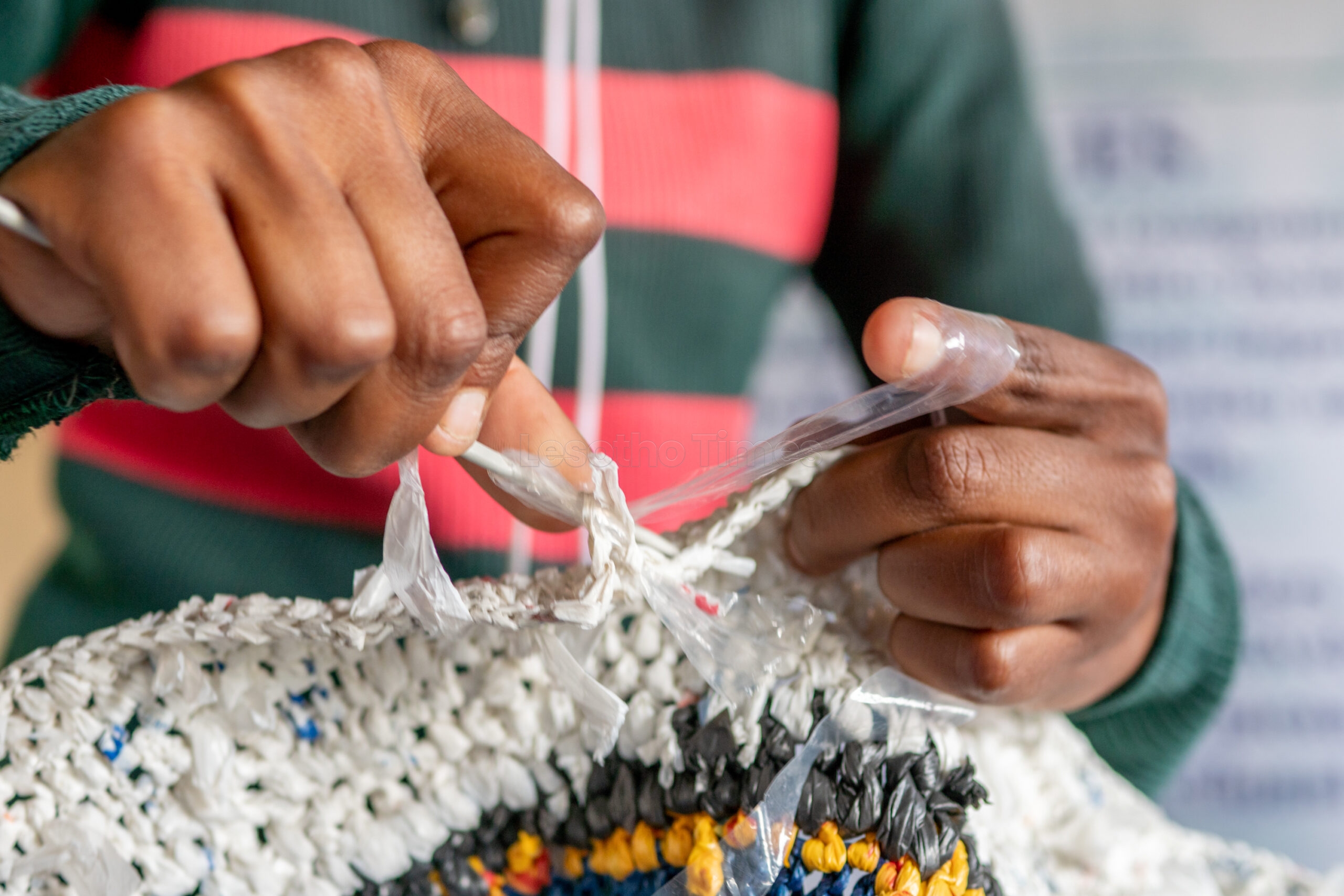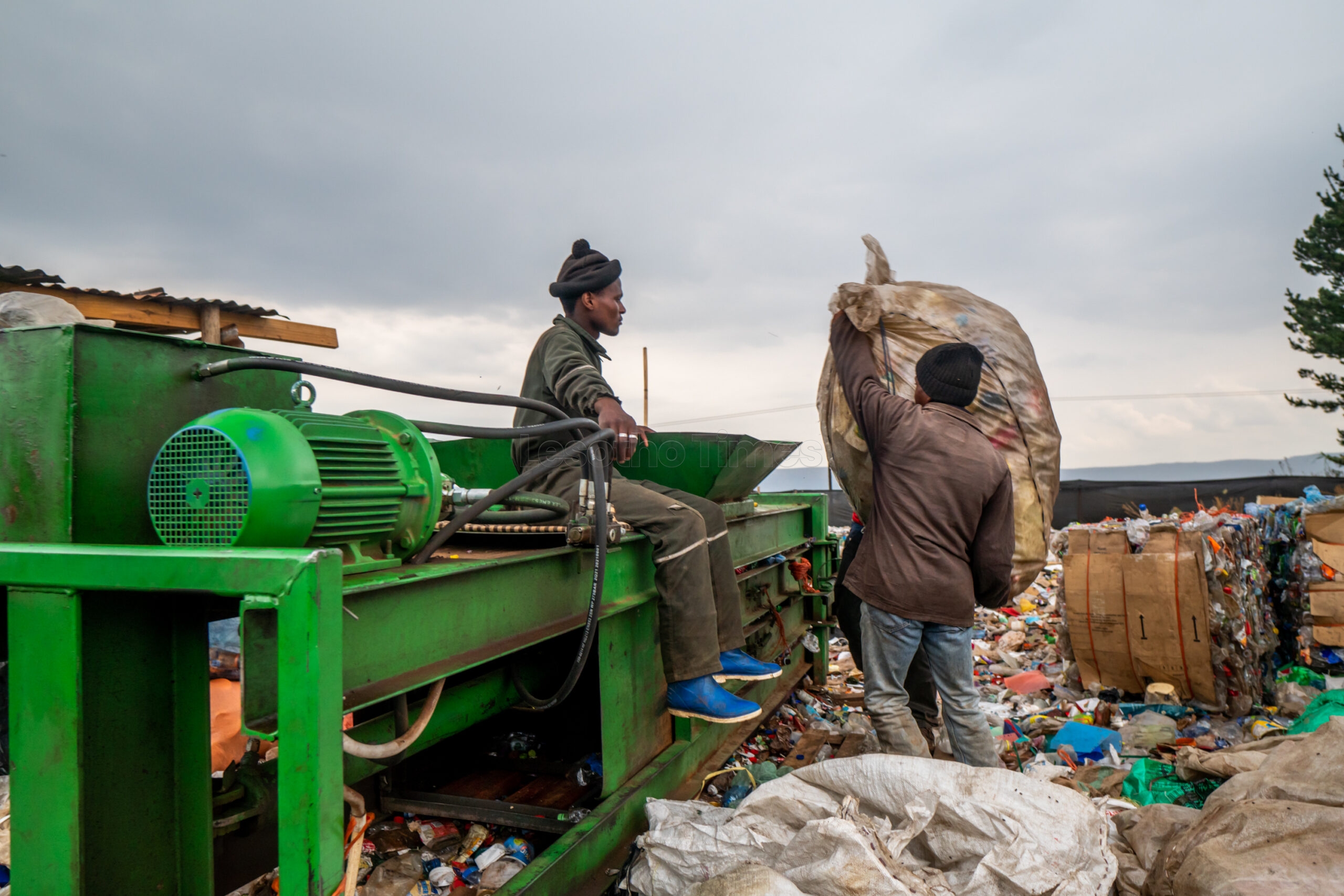—proving the old adage that “disability is not inability”
Mathatisi Sebusi
Disability is certainly not inability. The pupils of Thuso-e-tla-tsoa-kae School bear testament to this age old adage.
The name of their school, located in Botha-Bothe District, literally means “where will help come from”?
Perhaps to them, the idiom suggests that unless they help themselves, their circumstances wont change.
Even though they indeed get help from outsiders, it can never be enough. They therefore cannot afford to recline on their laurels and moan about their disabilities in expectation of handouts.
Instead, they have enmeshed themselves in innovative work to produce various products from plastic.
By recycling plastic, they also hope to significantly contribute to efforts to clean up the country and spruce its image to international visitors. Lesotho is highly polluted with plastic, particularly in the capital. The Maseru City Council has itself acknowledged that fact.
 The children from Thuso-e-tla-tsoa-kae school are thus determined to play their part in helping resolve the plastic problem.
The children from Thuso-e-tla-tsoa-kae school are thus determined to play their part in helping resolve the plastic problem.
They have learned skills to produce shoes, mats, hats, bricks, and other ornaments from plastic.
Their work is making waves while helping them financially.
They are being assisted in their endeavours by their school, a private company called Pretty Waste, and the United Nations Development Programme (UNDP).
The Thuso-e-tla-tsoa-kae school caters for children with multiple disabilities. It was established in 1985 at the height of the stigmatisation of people with disabilities. Its aim is to bridge the gap in the mainstream education system and provide opportunities for children with disabilities in Lesotho.
Pretty Waste is one of the local companies in Botha-Bothe in the field of waste management. It is cooperating with Thuso-e -tla-tsoa-kae School to equip its vulnerable children with the skills in plastic recycling and re-purposing.
The two organizations were awarded grants by the UNDP in partnership with the Ministry of Environment and Forestry under the ‘Strengthening partnership on sustainable plastic lifecycle management’ project in 2021.
The grants were meant to assist in expanding and sustaining ongoing plastic waste management initiatives at community level.
The project has been immensely helpful to the kids at Thuso-e-tla-tsoa-kae who are being capacitated with skills to produce shoes, mats, hats, bricks, and other ornaments from plastic.
Pretty Waste’s co-founder Tšeliso Motubane told the Lesotho Times they were also producing bricks from sand and plastic. He said these were very durable as plastic rarely weakens once melted.
Mr Motubane says the project is helping these children attain financial freedom while also ensuring a plastic free environment, effectively killing two birds with one stone.
He encouraged communities to collect plastic waste and sell it to his entity to enable the disabled kids to perform the task.
‘Mamoliko Mofilikoane, a teacher at Thuso- e- tla-tsoa-kae, says plastic recycling has empowered the children, whom she describes as having been on the verge of losing hope, by giving them an opportunity to learn and sharpen their craft skills. They were no longer idle.
Ms Mofilikoane says they plan to formalize their local market for the products and possibly expand countrywide.
To address the plastic pollution challenge, the Ministry of Environment and Forestry is a step closer to implementing the Waste Management Information System, aimed at combating plastic pollution and improve waste management in the country.
The system was launched in 2021 by the ministry in partnership with the UNDP.
The ministry’s environmental officer, Thabiso Leballo, told the Lesotho Times the system would respond to Lesotho’s struggles to properly manage its waste and consequently reduce plastic pollution.
Mr Leballo said the system is aimed at supporting partnership building and advocacy work on plastic life cycles and to encourage behavioral change in plastic production and consumption patterns.
He says the system was developed after realizing a gap in plastic management regarding information accessibility, which restricted the country from having informed strategies aimed at managing plastic pollution and waste.
“With the system in place, the government will have accurate data on waste management in the country and information on how much waste the country generates and imports, and how much of it contributes to GDP,” Mr Leballo, said.
“The system is built in such a way that information is collected in respect to global and national indicators and goals meant to address issues of waste management…..”
Mr Leballo says the system also offers literature and information on documents, websites, and laws relevant for waste management locally and internationally. It would also enable the ministry to track and monitor waste hot spots like dumpsites regardless of whether they were legal or not.
They will all be monitored to ensure they were properly managed.
The system would further enable the department of environment to assess the extent of pollution caused by these dumpsites, and how they affected surrounding areas.
He said they were currently in the process of arranging the content of the system using indicators which would be used to generate information.
Mr Leballo added the system would be accessible to everyone and profile all stakeholders in waste management and exportation.
He said once resources were allocated, the department would pilot the system in the three districts of Maseru, Leribe, and Mafeteng. They would start by training environment officers on how to capture waste data.
The Lesotho Times understands the government is in the process of drafting legislation aimed at cutting plastic pollution to protect the environment, communities, and animals.
The legislation would, among others, regulate the life cycles of plastic and impose levies on all plastic entering the country.
The proposed legislation will close the gaps in existing environmental law which was silent on plastic management.
Meanwhile, the ministry’s senior environmental officer, Kobeli Tšasanyane, who is familiar with the intended regulatory legislation, said the proposed law is aimed at ensuring a plastic free Lesotho, by among others charging levies on plastic.
Mr Tšasanyane said upon implementation of the legislation, Lesotho would not only be free from the adverse impact of plastic pollution but would also have a clean environment, and become an attractive destination for tourists and investors.
He said the levy imposition was meant to discourage people from using plastic in favour of re-usable shopping bags.
Through the proposed legislation, the country could track the quality and quantity of plastic entering the country and its exporters.
“Plastic exporters and manufacturers would be documented by the government and a levy would be imposed on all plastic entering the country,” Mr Tšasanyane said.
“The aim of the plastic levy is not to make money, but to discourage people from using plastic. People are encouraged to rather use reusable bags that they can only buy once.”
A recent study by the United Nations Institute for Training and Research states that Lesotho generates 137 510 tonnes of waste per year of which an average of 20 percent fall within collection system, whereas 80 percent was unaccounted for, either illegally dumped or ends up in open burning practices.
Data on waste generation continued to be scarce due to lack of resources to conduct studies in line with recent trends.
The study notes that, although Lesotho has a relatively lower waste generation rate, it is significant enough to warrant a paradigm shift towards proper waste management .
“Appropriate policies should be reviewed to address a broad range of environmental problems, toxic and hazardous substances, poor sanitation and waste management, air pollution and health care waste,” the study states.
It calls for improved delivery of environmental services including development of strategy for waste, construction and management of landfills and promoting and supporting recycling.
The study exhorts Lesotho to continue with its commitment in ensuring a healthy and safe environment through proper waste management.
In Maseru, the country’s economic hub, plastic pollution has been declared a national crisis by the city council.
Maseru City Council spokesperson, Makatleho Mosala, tells the Lesotho Times the council is aware of illegal dumpsites mushrooming in the capital’s townships.
Ms Mosala says the MCC has been encouraging communities, where the city’s waste trucks do not reach, to participate in community contracting where families pay people to collect their waste for disposal.
But she notes a lot of community members are reluctant to pay people to help dispose of their waste, choosing instead to dump waste everywhere.
In an effort to reduce the pollution, Ms Mosala says the government had come up with a programme of encouraging people across the country to clean their towns and surroundings every last Friday of the month.
“There are initiatives in place aimed at combating pollution, especially plastic pollution across the country. However, it is every person’s responsibility to ensure that their waste is collected and dumped at legal dumping site,” Ms Mosala said.

